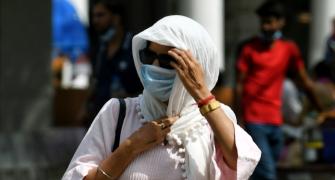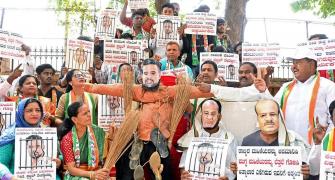"This kind of pattern of growth accentuates insecurities," argued Professor Ravi Shankar Srivastava of JNU's Centre for the Study of Regional Development.
In his keynote address, titled 'Expanding social security in the neo-liberal world: India's tryst with rights-based approach,' delivered at Guelph University last month, he discussed the lack of social security in India, more so for the poor.
In developing countries like India, "Vast segments of the population lack formal social security cover, and suffer from persistent chronic deprivation," Srivastava said.
'One reason for the lack of formal social security is that the high proportion of the workforce in the informal sector is either stagnant or increasing," he explained.
"Even in countries with high economic growth (India included), increasing numbers of workers - often women - are in less secure employment, such as casual labor, home work and certain types of self-employment. Although this phenomenon is not restricted to developing countries, the share of the informal workforce in such countries is exceptionally large," he said.
Therefore, Srivastava suggested that social security should form part of the human rights, basic rights of the people.
Rene Veron, who teaches geography and international development at Guelph University and who invited Srivastava, said that the "Lack of social security in countries like India is quite glaring. People there are very vulnerable. There's lot of insecurity for the poor. So social security is extremely important for them," he agreed with Srivastava. "There should be a right-based approach to development, and right-based social security."
To him Srivastava's argument that 'the pattern of growth accentuates insecurities' implied there was "lop-sided growth."
The growth being experienced in India is causing regional disparity to increase, he said. The growth was driven by urban development but not in the agricultural sector. If there was any, it was minimal, he said. Such lopsided growth leaves a large section of society losing out on the benefits of growth.
Veron rejected the accepted view that India's economic gains had begun percolating down to the poorer sections, saying such behavior was difficult to measure.
He and Srivastava worked on a joint project titled 'Globalisation and the Poor', a joint JNU and Guelph University project sponsored by the Indo-Canadian Shastry Institute. They studied various sectors in Madhya Pradesh.
"The general picture we found really is that the poor and the weaker sections generally cannot benefit very much from globalisation and liberalisation which are now being used for economic growth. Some sections of the society have now become more vulnerable as there's lack of employment opportunities for them," Veron said.
Their project was not to "argue against globalisation or liberalisation per se but we argued that the state really has to try to mitigate the negative consequences of globalization and liberalization. For doing that the state has to expand social security," Veron said.
In his keynote presentation, Srivastava said, "Once the right to social security is accepted as a human right it would obligate the state to accepting their 'substantive rights' including the right to food, health, education, etc."
Veron agreed that in Canada, social security implies state coverage for education and healthcare. "The state contributions in India on these sectors is very low," he said, agreeing with Srivastava.
"In India, formal social security arrangements (including health care, accidents, and old age benefits) cover eight percent of the workforce in the formal sector," he said, adding that another six percent of the workforce is believed to be covered under some sort of social security mechanism based on social insurance principles and state contributions.
He agreed India had "evolved a plethora of schemes programs to provide social assistance, generate employment during slack seasons and droughts, improve access of the poor to land and other productive assets, etc. But many of these schemes were not as effective as they should be, he said.
"India's social security expenditure is a relatively small part of GDP and total public expenditure - approximately 3.6 to 4.8 percent in the former case and 12 to 16 percent in the latter - depending on the items one chooses to include in the rubric of social security," explained Srivastava.
It is good for the people that during "the last few years' there have been 'a dramatic extension of rights-based social security initiatives in India, catalysed by civil society pressure and in many cases also supported by governments in power and by political parties across a wide spectrum."
This has interestingly "occurred in a period when a larger role for government in the social sector is certainly not self-evident," Srivastava said. He attributed this change to the deepening of Indian democracy.
Supporting Srivastava's suggestion for enlarging social security coverage and making that legally obligatory on the part of the state, Veron said to him the current economic growth in India "is not reaching all sections of the society. So we cannot lose sight of those people being left behind by this economic growth. Economic growth is probably giving the state a chance to invest more in social security and social welfare."
When asked whether social security could be entrenched in the basic rights in a country with huge population and huge disparity in income, Veron's answer was in the affirmative. "The bureaucracy in India is very strong. The country has already achieved quite a few things. So, I don't think it is totally impossible to improve social security aspect in the country," he said.
Both Veron and Srivastava referred to the arguments of Nobel Laureate Amartya Sen: "If you have social security properly entrenched, social security in terms of education and health, that way you will have more efficient and productive workforce. In other words good social development can eventually be very positive for economic growth," he said.







